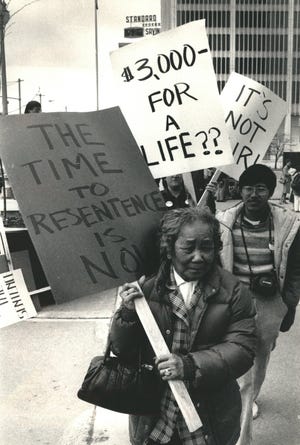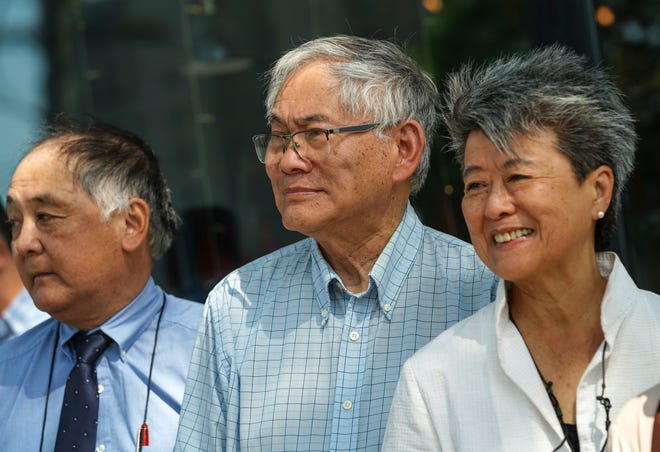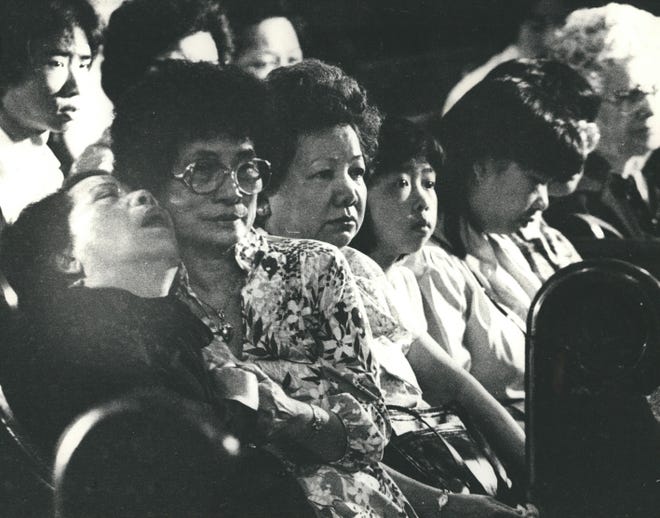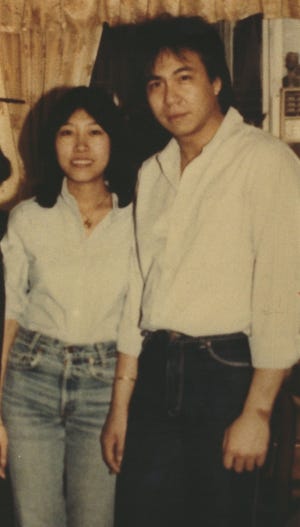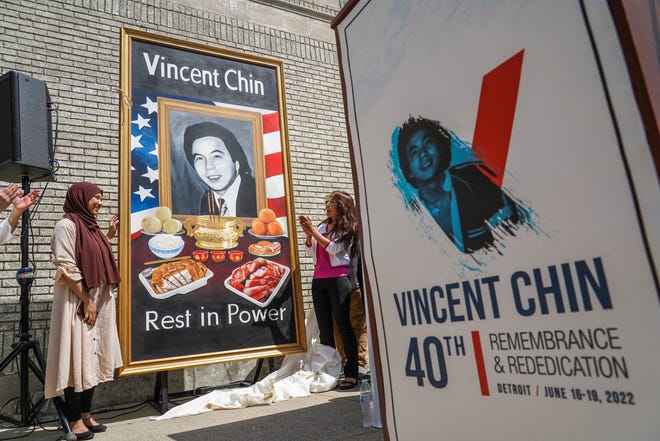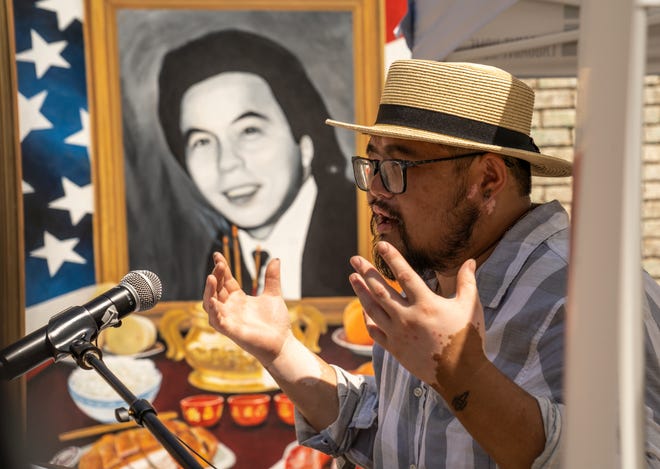DETROIT – Helen Zia remembers how stunned she felt 40 years ago when she read the two men who beat Vincent Chin to death in Highland Park, an enclave of Detroit, were only given probation in his death.
“I was just livid,” Zia, 70, an author and Asian American activist, recalled this week. “I couldn’t believe my eyes. Is this how this story ends, that his killers get off with probation? And what did that mean for people who might be targeted? Like, go ahead, kill an Asian American and you won’t go to jail.”
Chin, a Chinese American man, was beaten with a baseball bat in 1982 by white autoworkers, one of whom complained about Asian Americans taking away their jobs. He died days later.
The outrage mobilized Zia and other Asian Americans in metro Detroit who went on to make the Chin case a national cause, igniting a movement that continues today amid growing concern about anti-Asian racism.
As anti-Asian hate incidents have risen in recent years, the story of Chin still resonates as metro Detroit on Thursday marked 40 years since his death. Back then, Japanese people were perceived as the enemy during an economic downturn, leading to attacks in Michigan and other places against not just Japanese Americans, but Asian Americans in general.
“It was a time of economic and social crisis for the city, and people of Asian descent were blamed for it and were scapegoated,” Zia said.
The 40th commemoration of Chin’s death comes amid a pandemic where Asians were wrongfully blamed for the proliferation of the COVID-19 virus, fueling hate incidents around the country. It also comes amid similar economic problems such as inflation, leading at times to ostracism of Asian Americans.
“If you look Asian, you’re a target,” said Sylvan Lake attorney James Shimoura, a grandson of Japanese immigrants who was one of the key activists 40 years ago working on the Chin case. “That was true in 1982. It’s true today in 2022.”
ANTI-ASIAN HATE CRIMES ON THE RISE:Here’s what activists, lawmakers and police are doing to stop the violence
This month, there were four days of events remembering Chin and the struggles of Asian Americans, ending with an interfaith ceremony on Sunday at Chin’s burial site at Forest Lawn Memorial Park cemetery in Detroit.
Building coalitions for justice within the Asian community and beyond
As the Asian American population grows in southeast Michigan, communities are once again mobilizing to gain more political influence and preserve their rights.
One of the lessons learned four decades ago was coalition building, both within diverse Asian American communities sometimes divided by nationality and with other groups such as African Americans.
‘FETISHIZATION ISN’T APPRECIATION’:The dangers of dating as an Asian American woman
Black civil rights and labor leaders such as the late Rev. Horace Sheffield Jr., whose granddaughter is Detroit City Council President Mary Sheffield, gave “incredible support” to Asian Americans after Chin was killed, helping them publicize the case, Zia said. The Rev. Jesse Jackson and leaders with the NAACP and National Urban League also spoke out.
“We really are trying to lift that up, the multiracial, multicultural, interfaith movement that was created in Detroit,” Zia said. “We’ve done it before. … The drumbeat today is, we’re so divided. … We can show that we have come together and we accomplished a lot together.”
As an idealistic child of the 1960s, Zia moved from Boston to Detroit in the 1970s to be part of the labor movement in a place known nationally known for its strong unions.
She became an autoworker, working as a large press operator at a Chrysler plant. But she later got laid off from Chrysler as the oil crisis of the 1970s led to rising unemployment in Michigan. A child of immigrants from China, Zia and others felt the rising anti-Asian prejudice.
Back “then, every day on the TV, radio, news, the halls of Congress, the C suites of auto companies was: ‘We’re at war; Japan is the enemy,'” Zia said of the climate in the early 1980s.
CHINATOWNS REACT:Chinatowns become more vibrant close-knit hub amid pandemic, anti-Asian violence
In Detroit, cars made in Japan were sometimes shot at on the freeways, Zia recalled. Just a few months before Chin’s death, in March 1982, former U.S. Rep. John Dingell, a Democrat, referred to Japanese people using a racist slur, the New York Times reported. Dingell later apologized. The month before Chin’s death, a Chrysler board member said on a local radio station the U.S. should drop another atomic bomb on Hiroshima to deal with Japanese competition, the Free Press reported.
“There are really terrible parallels to what’s going on today,” Zia said.
ATTACKS ON ASIANS:Asian women continue to face ‘terrifying’ attacks in the US. What advocates say needs to change.
A report released in March by Asian American advocacy group Stop AAPI Hate said there were 10,905 hate incidents against Asian Americans and Pacific Islanders from March 19, 2020, through the end of last year. About 120 of those were in Michigan. The group started collecting data near the start of the pandemic when Asian Americans started to face bias incidents as some sought to link the virus to China.
More than 16% of the hate incidents involved physical assaults. Chinese Americans were the most common victims.
The killings last year of eight people in Atlanta, six of them Asian women, shook many, leading to protests, including some in metro Detroit.
ATLANTA SHOOTING:Atlanta spa shootings, one year later: Families share their ‘pain,’ denial,’ and ‘collective grief’
Vincent Chin’s death: A fight, a baseball bat and a racial slur
On June 19, 1982, Chin and his friends were celebrating his upcoming marriage at a club in Highland Park, according to court testimony. Autoworkers Ronald Ebens, 43, and his stepson Michael Nitz, 22, got into an argument.
Witnesses said a racial slur against Japanese people was hurled at Chin, as well as comments about Japanese people stealing their jobs. The attackers denied making racial remarks and accused Chin of starting the fight.
A scuffle broke out and Chin left the club. Later, Ebens and Nitz searched for Chin, finding him outside a McDonald’s. As Nitz held him, Ebens pounded him several times with a baseball bat. His last words according to a witness were: “It’s not fair.”
Chin died a few days later on June 23.
ASIAN VIOLENCE:Anti-Asian American violence is still raging. AAPI teachers are trying to stop it.
Zia and others followed the case in local newspapers, but it was the probation sentence the following year that ignited the movement.
They had a difficult time getting heard by politicians, prosecutors and progressive activists. Zia said Asian Americans were rarely covered by the news media.
“We were so invisible,” Zia said.
THIS IS AMERICA:Let’s celebrate the full diversity of our community this AAPI Heritage Month
As the case drew national attention due to the work of local activists and Zia, who was a freelance journalist at the time, the Department of Justice intervened, bringing federal civil rights charges.
Ebens was found guilty in the federal trial, but his conviction was later overturned by an appeals court. A civil lawsuit was then filed and a settlement was reached, with Ebens ordered to pay $1.5 million. Today, that amount is estimated to be up to $10 million, which he still owes, Zia said. Ebens lives in Nevada and couldn’t be reached for comment.
Asian Americans were disappointed in what they say was an indifferent attitude among prosecutors. And the judge who sentenced the men, Charles Kaufman, praised them during the sentencing, saying: “These weren’t the kind of men you send to jail.”
White suspects being perceived automatically as people of good character in contrast to minority defendants is an issue that still exists today in the criminal justice system, advocates said.
WILL PASSING LAWS HELP?:Congress urged to address hate crimes, but ‘hate is a hell of a motivator’
Advocates say the Chin case showed Asian Americans the need to get more involved in politics and government.
In Michigan, there are now about 405,000 residents of Asian descent, making up about 4% of the state’s population according to 2020 census data.
The growth of the Asian population can be seen in places like western Wayne County, Oakland and Macomb counties, and Ann Arbor. But while there are now four state legislators of Asian descent representing parts of metro Detroit, they are often absent at the local level in government.
Asian American activism in a pre-internet era
Before the internet, it was challenging for activists to publicize cases, Shimoura recalls.
In their early days of the case, they would gather at a Chinese restaurant in Ferndale where Chin used to work. Today, there’s a memorial on Woodward Avenue and 9 Mile Road in the median remembering Chin.
“A lot of it was spread word-of-mouth,” Shimoura said. “We put out a lot of press releases. We traveled a lot giving speeches, doing rallies across the country.”
Chin’s mother, Lily Chin, didn’t speak English well, but gave speeches and appeared on “The Phil Donahue Show.”
One advantage is that back then, the news cycles tended to be longer, and so the case had a staying power in contrast to today, when stories fade more quickly, Shimoura said.
Asians a key part of Detroit’s history
On Wednesday, activists gathered in Detroit in what used be the city’s Chinatown to unveil a new mural and memorial remembering Chin, hoping it will remind future generations of the case and the history of Asian Americans in the city.
Many Asians in metro Detroit have been here for several generations, such as Shimoura.
Shimoura’s grandfather, James or Tadae in Japanese, emigrated from Japan in the early 20th century and became a chemist working at Ford Motor Co.
After Japanese Americans were released from internment camps during World War II, a number of them moved to Detroit. Now, the two biggest groups among Asian Americans in Michigan are Indian Americans and Chinese Americans.
Shimoura led an Asian American group during his college years at Michigan State University. After Chin was killed, he reached out to people he knew for support. Together, they made thousands of phone calls and wrote letters and telegrams to spread the story.
Shimoura said 40 years ago, the Asian community was fractured, but it came together for Chin’s case.
Zia said that unity is important to hold onto amid a rise in anti-Asian hate incidents nationwide.
“Vincent Chin matters today because what happened to him 40 years ago is very similar to what’s going on today,” she said. “It’s very important to remember that back then people came together to stand up and say, no more, that hate does not belong in America.”
“We’re at a very urgent time,” she added. “We have come together before and we are standing up together.”
Contact Niraj Warikoo:nwarikoo@freepress.com or Twitter @nwarikoo


